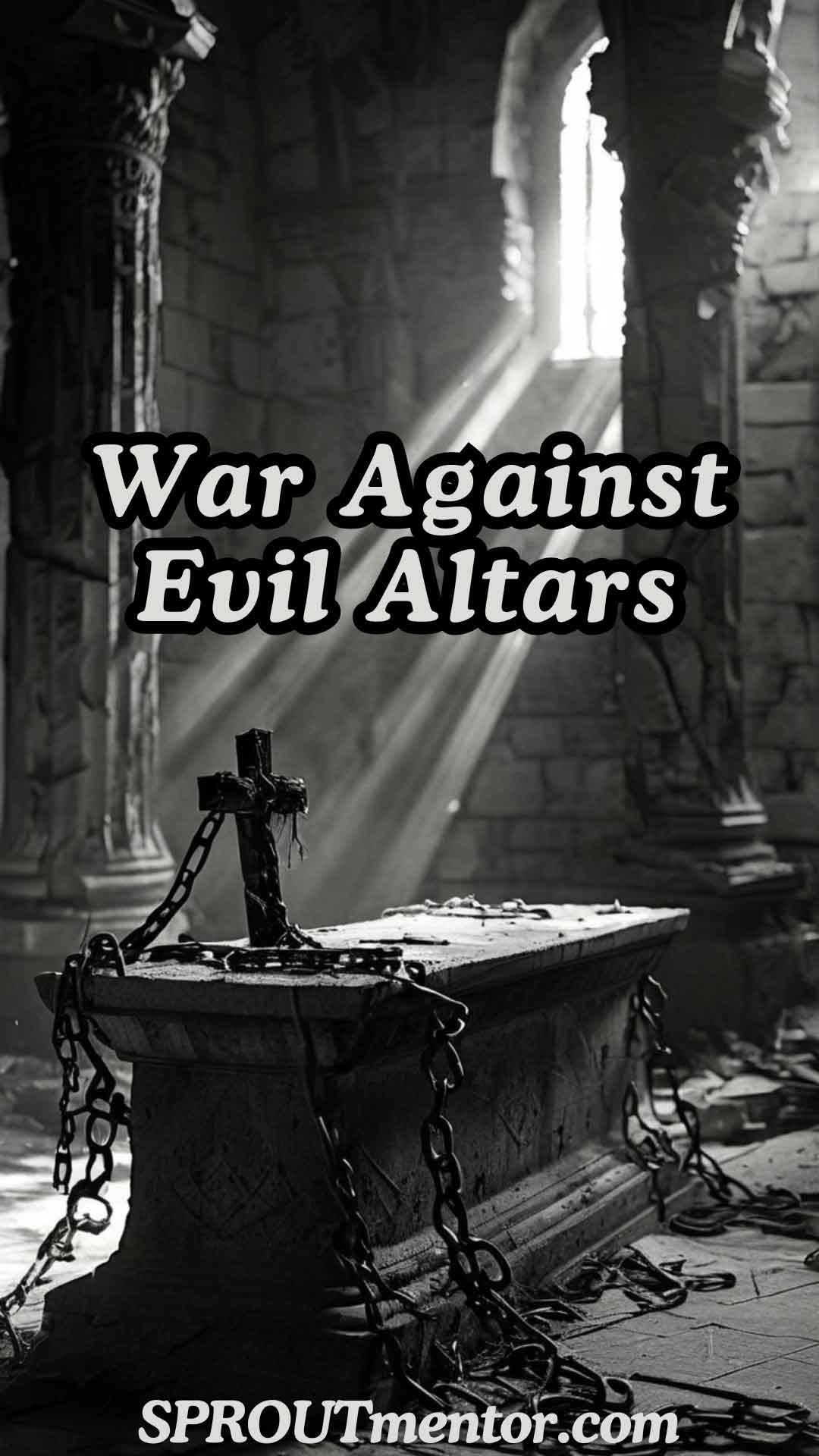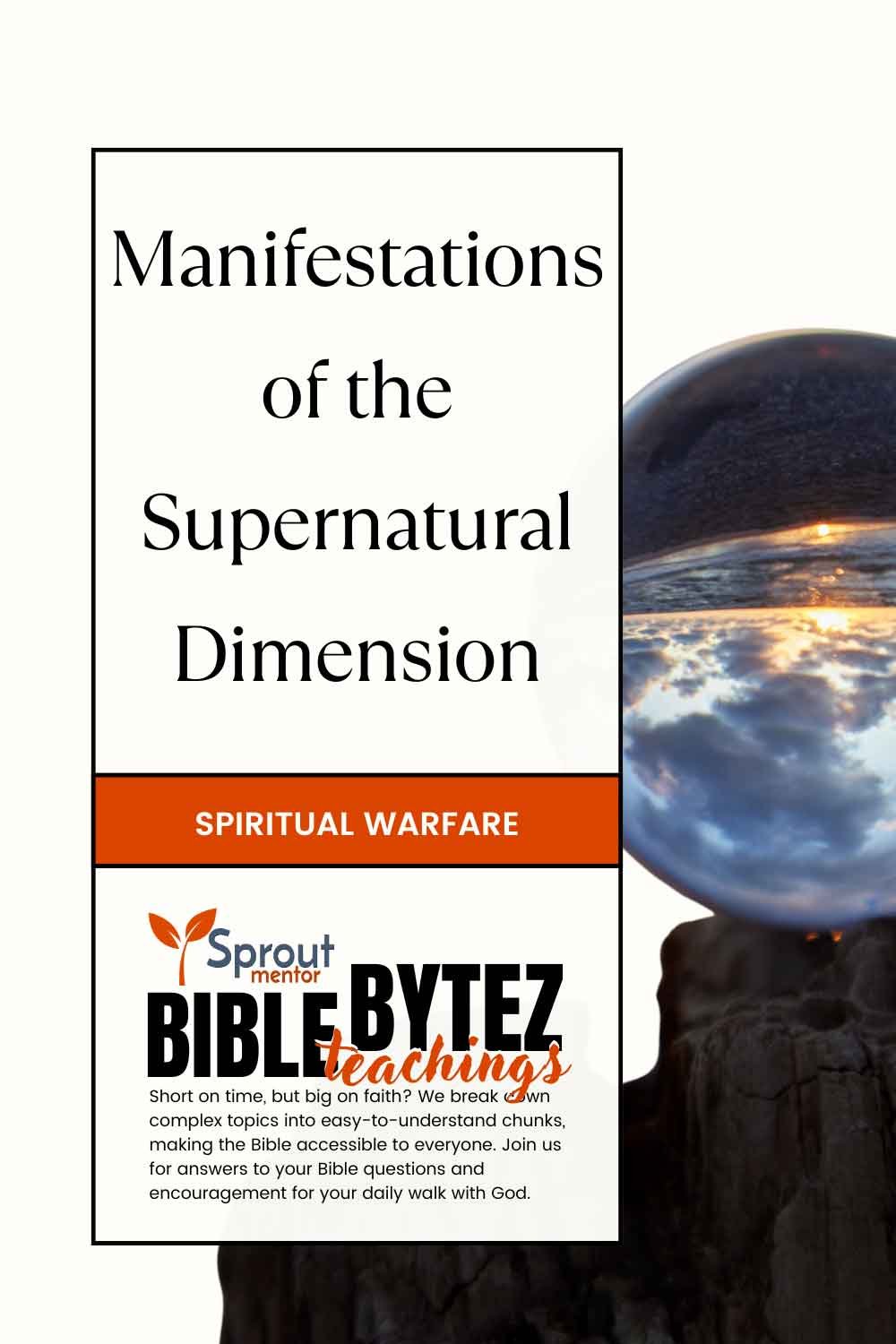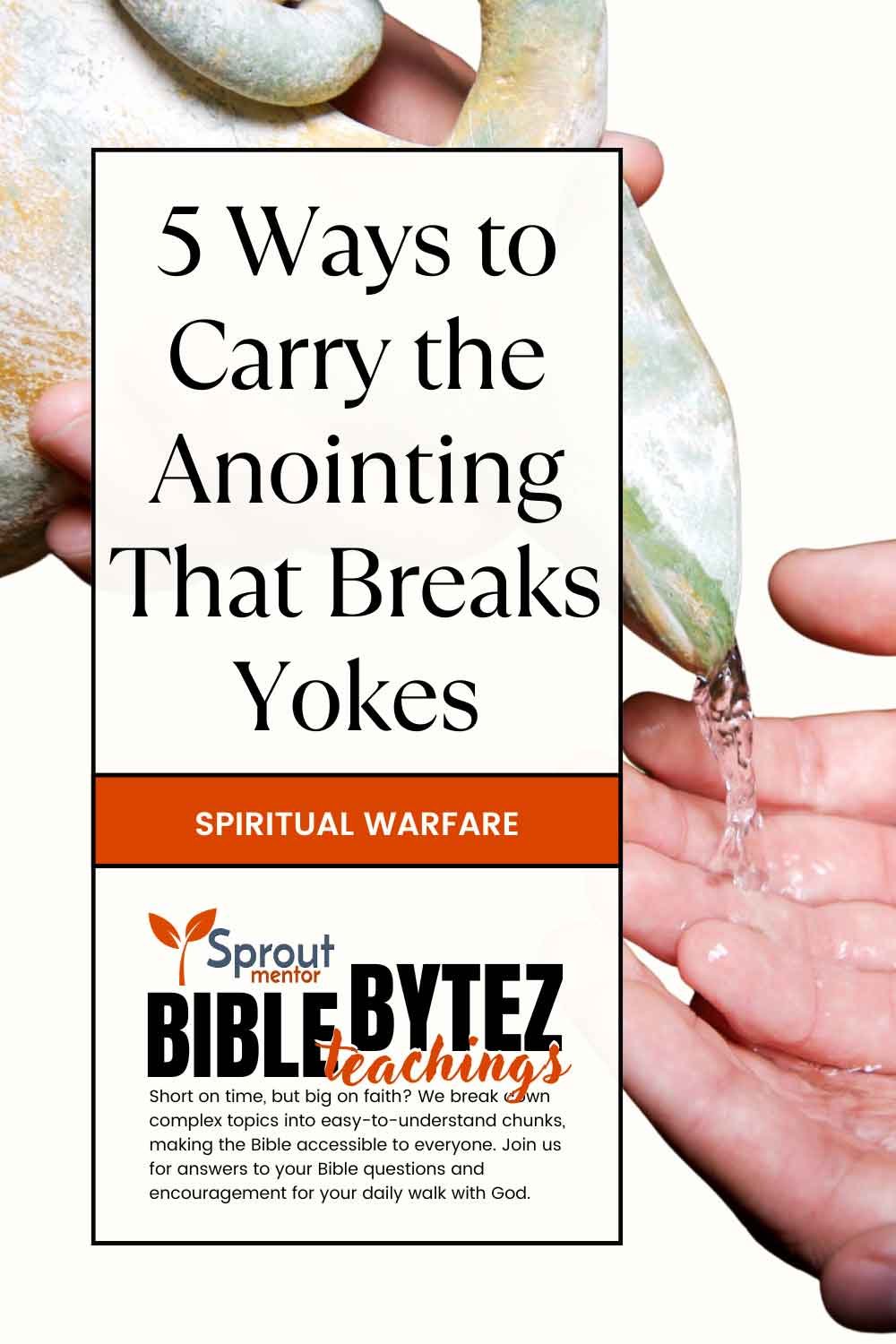Spiritual Warfare Against Evil Altars

Share This Blog Post On:
Facing unseen battles in your daily life? We equip you with biblical truth and practical strategies to stand firm against spiritual opposition. Join us for insights on spiritual warfare and strength for your faith journey. Click here to armor up and walk in victory, one truth at a time!
This teaching is a continuation of this previous lesson where we explored patterns that signify the presence of an evil altar working against you.
In today’s lesson, we will delve into these three aspects:
- The Biblical Basis for spiritual warfare against evil altars
- The Tokens of Guilt: Entry points that give Satan and his agents legal grounds to manipulate our lives and territories through evil altars.
- The Deliverance of the Lawful Captive: The divine provisions that legally deliver us from evil forces.
[A] The Biblical Basis for Spiritual Warfare Against Evil Altars
Scripture provides us with numerous accounts of God’s people confronting and destroying evil altars.
These ten Old and New Testament Bible figures below serve as:
- Powerful case studies for spiritual warfare against altars.
- Proofs that the dismantling of evil altars is not only possible but an expected part of our walk with God.
#1 – Gideon
- God called Gideon to tear down his father’s altar to Baal and cut down the Asherah pole beside it [Judges 6:25-32].
- Gideon’s obedience paved the way for subsequent victory over the Midianites.
#2 – Jesus
- In a dramatic display of authority, Jesus drove out the money changers from the Temple[Matthew 21:12-13, Mark 11:15-17, Luke 19:45-46, John 2:13-16].
- This act symbolized the need to purify God’s house from the corruption and influence of those who had turned it into a marketplace.
#3 – Elijah
- The prophet Elijah challenged 450 prophets of Baal to a showdown to demonstrate the power of the one true God over the false god Baal [1 Kings 18:20-40].
- Elijah’s destruction of the prophets’ altar was a decisive blow against the enemy’s influence.
#4 – Paul and Silas
- When Paul and Silas encountered a slave girl possessed by a spirit of divination, they ministered deliverance [Acts 16:16-24].
- By doing so, they dismantled the spiritual stronghold that was being used to make money through fortune-telling.
#5 – King Josiah
- As part of his sweeping religious reforms, the righteous King Josiah commanded the destruction of all the altars and high places dedicated to Baal, Asherah, and the host of heaven [2 Kings 23:4-20].
- This bold act of obedience purged the land of idolatry and paved the way for spiritual renewal.
#6 – Peter
- When Simon the sorcerer tried to purchase the power of the Holy Spirit, Peter sharply rebuked him, discerning the spiritual wickedness at work [Acts 8:9-24].
- This confrontation was a direct challenge to the spiritual authority Simon had built through his occult practices, leading him to repentance.
#7 – Jacob
- Responding to God’s call, Jacob instructed his household to put away their foreign gods and purify themselves before he built an altar to the Lord[Genesis 35:1-4].
- This decisive action demonstrated his commitment to honoring God and dismantling any competing spiritual influences.
#8 – Idols in Thessalonica
- In his letter to the Thessalonian church, Paul commended the believers for turning from idols to serve the living and true God [1 Thessalonians 1:9-10].
- The turning away from false gods and the dismantling of any idolatrous altars or practices was a vital part of their conversion and their commitment to follow Christ wholeheartedly.
#9 – Moses
- When the Israelites turned to idolatry by worshiping the golden calf, Moses took decisive action [Exodus 32:15-20].
- He burned the calf, ground it to powder, scattered it on the water, and made the people drink it, thereby dismantling the altar and idol they had erected.
#10 – The Seven Sons of Sceva
- These Jewish exorcists attempted to cast out demons by invoking the name of Jesus, but the evil spirit overpowered them [Acts 19:13-16].
- This incident demonstrated the importance of operating in genuine spiritual authority, rather than merely using the name of Jesus as a magical formula, which can empower the enemy.
[B] The Tokens of Guilt
These are the spiritual entry points or loopholes that give Satan and his agents legal grounds to establish and operate evil altars against us.
In Ephesians 4:27-28, Apostle Paul warned us, “Do not give the devil a foothold.”
- Why is this so important?
- Because Satan only needs the smallest opportunity to carry out his three-point agenda: to steal, kill, and destroy [John 10:10].
- He doesn’t require a fully open door; just a small crack is enough to turn a foothold into a stronghold.
- Jesus illustrated how a foothold becomes a stronghold in several key passages, such as:
- Matthew 12:43-45: When you open the door to one evil spirit, it doesn’t come alone; it brings seven others.
- Mark 5:1-10: The Gerasene demoniac was possessed by a “legion” of demons, a term derived from the Roman military, which could consist of 2,000 to 12,000 soldiers. This indicates that the man was bound by an overwhelming number of demons.
- In these examples and many others, Jesus demonstrated that demons, evil spirits, and other agents of Satan operate in gangs.
- You may open the door for one, but in the end, they will overtake your territory, for they work in armies.
Consider this story:
- A man was helped by a friend to build a house under the condition that the friend could have just one nail in the living room to hang whatever he wanted.
- The man agreed, thinking it was no big deal—after all, it was just one nail.
- Initially, the friend hung good things on the nail, but one day he brought a dead rat and hung it there.
- Within a week, the stench was so unbearable that the man had to vacate the house.
This is exactly how Satan operates:
- He knows how to turn small opportunities into big investments.
- Remember, unlike us who are mortals, he is called the “ancient serpent,” in Revelation 12:9, meaning he is an old, cunning creature with far more knowledge than we can comprehend.
- Just as the stench of a single dead rat can drive someone out of their home, the smallest foothold can lead to significant spiritual damage if left unchecked.
Here are five ways we intentionally or unintentionally give Satan a foothold or tokens to declare us guilty in the divine legal judgment system:
#1 – Sin
- Sin is the act of missing the mark or falling short of God’s standard of holiness.
- Since man was created in God’s image and likeness [Genesis 1:26], sin corrupts this divine image and gives Satan a legal right to accuse us before God.
- Sin creates spiritual “filthy garments” that Satan can use as evidence against us in the heavenly courts, demanding judgment [Zechariah 3:1-5].
- This is why Satan is called the “accuser of the brethren” [Revelation 12:10].
- He seeks opportunities to bring accusations against us, particularly when we are caught in unrepented sin.
- Unrepented sin gives Satan the legal right to establish and operate evil altars against us, leading to various forms of spiritual and physical afflictions.
#2 – Iniquity
- Iniquity refers to habitual sin, a continuous and deliberate use of one’s will against God’s will.
- Unlike occasional sin, iniquity represents a persistent pattern of rebellion like in the examples of:
- Israel’s Idolatry: The Israelites’ repeated idolatry led to their captivity and oppression by foreign nations, showing how iniquity leads to spiritual and physical downfall.
- King Saul: Saul’s continuous disobedience eventually led to the loss of his kingdom [1 Samuel 15:23].
- This entrenched behavior creates a stronghold that Satan exploits to manipulate and dominate our lives.
#3 – Compatibility
- This refers to harboring attitudes, behaviors, or influences that align with Satan’s nature.
- These might include anger, bitterness, pride, or lust.
- When we allow these traits to take root, we make ourselves vulnerable to Satan’s influence and manipulation.
- For example, in Luke 22:31-32 Jesus warned Peter that Satan had asked to sift him like wheat.
- Satan had seen something compatible in Peter—perhaps his fear or impulsiveness—that gave him the right to test him.
- This teaches us that holding onto traits aligned with Satan gives him a foothold in our lives.
- We should instead build intimacy and fellowship with the Holy Ghost so that we bear the fruits of the Holy Spirit [Galatians 5:22-23]
#4 – Divination
- This is the act of seeking guidance or solutions from sources other than God, such as fortune-tellers, mediums, or astrologers.
- Engaging in these practices is equivalent to making a covenant with Satan, thereby giving him authority in our lives.
- In Isaiah 8:19 the prophet Isaiah warned against consulting mediums and spiritists, highlighting that such actions lead to spiritual bondage and separation from God.
#5 – Inheritance
- In most cases this one occurs unintentionally making it the most dangerous because;
- When a covenant is made between a mortal and an immortal entity, that covenant remains valid for eternity because the immortal being does not die.
- Just as physical assets can be inherited, the results, both blessings and curses, of spiritual transactions can also be passed down through generations as proved by the examples below.
- Examples of Blessings and Virtues Passed Down:
- Eternal Life [John 4:38]: Jesus and the apostles labored for the Gospel, and today, we enjoy the benefits of their labor.
- Faith [2 Timothy 1:5]: Paul acknowledged that Timothy inherited his faith from his mother Eunice and grandmother Lois.
- Angelic Cover [Genesis 48:16]: Jacob, when blessing his grandsons Ephraim and Manasseh, he passed on the angel of deliverance that had been his guardian to them.
- Spiritual Military Power [2 Kings 2:12]: When Elijah was taken to Heaven, Elisha inherited the chariot of Israel and its horsemen.
- Covenants [Genesis 12:8]: Abraham built an altar at Bethel, and later, his grandson Jacob experienced the benefits of that covenant when he had an encounter at the same place.
- Examples of Curses and Negative Spiritual Influences Passed Down:
- Sin & Death [Romans 5:12]: Through Adam’s sin, death and sin entered the world, affecting all his descendants.
- Trans-generational Bondages [Exodus 20:5]: God warned that the iniquity of the fathers will be visited upon the children of the third and fourth generations.
- Demonic Impartations [2 Kings 21:6]: King Manasseh’s engagement in occult practices brought demonic influences and oppression upon Judah.
- Inherited Curses [Joshua 6:26]: After the destruction of Jericho, Joshua pronounced a curse on anyone who would rebuild the city. This curse was fulfilled in 1 Kings 16:34 when Hiel of Bethel rebuilt Jericho at the cost of his firstborn and youngest sons.
- Spiritual Repression: This occurs when an evil altar suppresses a person’s spiritual growth, gifts, or destiny. For instance, in Judges 6:25-27, God instructed Gideon to destroy his father’s altar to Baal, which had repressed their spiritual freedom. Once destroyed, Gideon began his journey as Israel’s deliverer.
- Sickness and Diseases [2 Samuel 24:15-25]: David built an altar to stop a plague that had come upon Israel due to his sin. This story illustrates how spiritual issues can manifest as physical ailments, and how the destruction of an evil altar can lead to healing.
[C] The Deliverance of the Lawful Captive
The presence of any of the tokens of guilt mentioned above makes one what the Bible refers to as a “lawful captive.”
When we speak of being a “lawful captive,” it refers to a situation where an individual has, knowingly or unknowingly, violated a spiritual law, thereby giving Satan the legal right to oppress or accuse them.
#1 – The Legal Nature of the Spiritual Realm
- Just as there are laws that govern the physical world, there are spiritual laws that dictate what is permissible and what is not.
- These laws are set by God and are enforced with precision for His throne is established on the foundation of justice and righteousness [Psalms 89:14]
- The Biblical texts below prove that the spiritual realm also has a judicial system where legal rights and wrongs are weighed and judged.
- Genesis 4:1-15: Shows us a legal accusation in the spiritual realm that led to Cain’s curse and exile.
- Zechariah 3:1-5: Symbolizes the spiritual courtroom where accusations are weighed and grace is granted.
- Job 1-2: Demonstrates the judicial order of the spiritual realm.
- 1 Kings 22:19-23: Reveals an example of judicial decisions made in the spiritual realm.
- Daniel 7:9-10: Depicts the spiritual courtroom where deeds are examined, and divine judgments are issued.
- Acts 5:1-11: Illustrates how sin is not only a moral offense but also a legal violation in the spiritual realm, with severe consequences.
#2 – Satan – Our Accuser
- Satan is often described as the “accuser of the brethren” [Revelation 12:10].
- This role is similar to that of a prosecutor or lawyer in a courtroom in the physical realm.
- His primary function is to accuse believers before God, pointing out their sins and shortcomings to demand judgment.
- No wonder, after he fell from glory, as depicted in Ezekiel 28:12-17, the only place Satan is allowed to visit in Heaven is the court.
- This is confirmed in Job 1:6-7, where Satan presented himself before God, acting as the accuser of Job.
- Just like a skilled attorney, Satan meticulously gathers evidence against us.
- He knows the spiritual laws and uses them to build his case.
- If we have violated these laws—through the tokens of guilt above—he will argue that we deserve the consequences associated with those actions.
#3 – Jesus Christ – Our Advocate
- Jesus Christ acts as our advocate, defending us against Satan’s accusations [1 John 2:1].
- His sacrifice on the cross paid the penalty for our sins, satisfying the legal requirements of justice [Colossians 2:15].
- For that reason, through Jesus Christ anybody can be set free even the lawful captives.
—”Shall the prey be taken from the mighty, or the lawful captive delivered? But thus, saith the LORD, Even the captives of the mighty shall be taken away, and the prey of the terrible shall be delivered: for I will contend with him that contendeth with thee, and I will save thy children.” — [Isaiah 49:24-25]
- This is a powerful declaration that God has the authority to override legal standings that bind us, offering deliverance through His divine intervention.
- During His Earthly ministry, Jesus set free so many ‘lawful captives’ like the examples of:
- The Woman with the Bent Back [Luke 13:10-17]: This woman had been crippled for 18 years, bound by a spirit of infirmity. Jesus healed her by invoking the principle of divine mercy for she was a “daughter of Abraham” whom Satan had kept bound [Luke 13:16]. In other words, legally she was entitled to freedom and healing as part of God’s covenant promise to the descendants of Abraham. Jesus declared her healing by invoking the covenant promise to Abraham’s descendants, effectively nullifying Satan’s legal right to afflict her.
- The Demoniac of Gadara [Mark 5:1-20]: Possessed by a legion of demons, this man’s bondage was a severe case of spiritual oppression. Jesus demonstrated His authority over spiritual forces, showing that He has the legal right to liberate those bound by demonic powers for He is seated far above all rules, authorities, and powers in the heavenly places [Ephesians 1:21].
- The Blind Beggar of Jericho [Mark 10:46-52]: Jesus healed this man in fulfillment of the Messianic prophecy in Isaiah 61:1, which speaks of giving sight to the blind. His faith in Christ was the key that unlocked his healing, nullifying the legal claim of blindness over his life.
- The Paralytic Lowered Through the Roof [Mark 2:1-12]: This man’s condition was likely connected to sin, as Jesus first forgave his sins before healing him. By addressing the root cause, Jesus demonstrated that He has the authority to forgive sins and override any legal standing that might have kept the man bound to his infirmity.
- The Woman Caught in Adultery [John 8:1-11]: According to Jewish law, this woman was condemned to death for her sin. Jesus, applying the principle of grace, redeemed her from the condemnation, showing that divine mercy can overturn legalistic judgments.
- In Genesis 15, God established a covenant with Abraham, and this covenant provided protection and blessing for Abraham and his descendants.
- Likewise, through Christ, we are partakers of a new and eternal covenant, ensuring our divine protection and favor [Galatians 3:29].
- Hebrews 8:6 explains how Jesus mediated a better covenant, which provides better promises.
- When we live under the covenant established by Jesus, we are under divine protection for it secures our spiritual covering.
#4 – Right Legal Standing in Jesus Christ
- How can we live as per God’s laws to avoid giving Satan any legal grounds to accuse, oppress, or afflict us?
- Jesus Christ can only guarantee protection and deliverance when we fulfill the demands of spiritual covering.
- The spiritual covering can be likened to a divine insurance policy—a set of laws and principles established by God to ensure the protection and preservation of His people.
- Below are six principles of spiritual covering that, when adhered to, can liberate you from the influence of evil altars.
#I – Detachment
- You cannot serve both God and Satan [Matthew 6:24; 1 Corinthians 10:21]
- God is holy (separate from all other hosts—1 Peter 1:16) and jealous (He requires exclusive worship—Exodus 34:14).
- In Hebrews 11:24-27 we see that Moses had to detach himself from the privileges of being Pharaoh’s daughter’s son before he could follow God.
- Also, in Genesis 12:1, Abraham was called to leave his kindred and his father’s house, separating himself from idols to fully consecrate himself to God.
- Choosing God will always require you to give up what is unholy or displeasing in His sight.
- The Holy Spirit must have lordship over your flesh, and Jesus must reign over your life.
- If you are lukewarm, God will reject you [Revelation 3:16].
- Therefore, you must commit fully to God or risk remaining a victim of the enemy’s schemes.
#II – Repentance
- Repentance is more than just saying sorry; it involves a complete change of direction—from moving toward sin to moving toward righteousness.
- The story of the prodigal son in Luke 15:11-32 illustrates true repentance—a total turn from a life of sin back to the Father’s house.
- God has promised healing and deliverance if we repent and turn to the right path [2 Chronicles 7:14].
- For example, originally, the principle of inheritance required that sin be punished up to the fourth generation [Exodus 20:5].
- However, in Ezekiel 18:1-9, we see an amendment where judgment and punishment depend on an individual’s choice.
#III – Headship
- The story of Reuben offers a profound example of what can happen when this principle is violated.
- Reuben, the firstborn son of Jacob, broke the principle of headship by sleeping with his father’s concubine.
- This act was not just a grave sin but also a direct violation of the spiritual authority and respect owed to his father.
- Reuben did not seek his father’s forgiveness, which parallels how we often take God’s love and mercy for granted, assuming that our transgressions are forgotten with time.
- However, this was not the case for Jacob, who remembered Reuben’s sin even in his old age.
- When Jacob was on his deathbed, he blessed his sons but cursed Reuben because of what he had done [Genesis 49:3-4].
- This curse had far-reaching consequences, as it caused Reuben and his tribe to suffer defeats in battle, illustrating the spiritual weight and long-lasting impact of violating headship.
- In the spiritual hierarchy, only someone with equal or greater spiritual authority could reverse such a curse.
- In Deuteronomy 33:6, Moses, who had headship over the nation of Israel, made an intercessory prayer for Reuben, asking God to let Reuben live and not let his men be few.
- The story of Reuben aligns with the teachings of Paul in 1 Corinthians 11:3, which outline the hierarchy of headship: Christ is the head of every man, the man is the head of a woman, and God is the head of Christ.
- We see in Jude 1:9 that Archangel Michael, instead of directly rebuking Satan, he wisely invoked the authority of Jesus, saying, “The Lord rebuke you!”.
- This highlights the principle that even spiritual beings acknowledge the supremacy of Christ in matters of spiritual warfare
- In a family, the father’s and husband’s role as the head is divinely ordained, as family and marriage are God’s ideas, not Satan’s.
- This structure is not merely about authority but about protection, order, and spiritual covering.
- For example, Numbers 30 illustrates the power of a father’s headship, as a father or husband could nullify vows made by his daughter or wife, demonstrating the authority vested in him by God.
- Also, in 1 Corinthians 11, Paul warned that if a husband is under any headship other than Christ—whether it be his father, money, job, or Satan—it leads to two significant problems: the rejection of his leadership by his wife and a closed spiritual realm, making his prayers and prophecies ineffective.
- Moreover, spiritual leaders, who hold headship over their congregations, play a vital role in interceding and breaking curses, just as Moses did for Reuben.
- Another similar example is the one found in Luke 22:31 where Jesus interceded for Peter’s faith to be strong when Satan sought to sift him like wheat.
- In Hebrews 13:17, we are told to submit to our spiritual leaders as they keep watch over our souls.
- When we reject God-appointed leadership, we place ourselves outside of His spiritual covering.
- Humility and submission to God’s will are key aspects securing this spiritual covering.
- James 4:7 reminds us to “Submit yourselves, then, to God. Resist the devil, and he will flee from you.”
- Without submission, resistance against the enemy becomes futile.
- Even Jesus, though equal with God, submitted to the Father’s will [Philippians 2:5-8], showing the power that comes with obedience to authority.
#IV – Faith & Trust
- Ephesians 6:16 describes faith as a “shield” that extinguishes all the flaming arrows of the evil one.
- Without unwavering trust in God’s protection, we expose ourselves to spiritual attacks, for where faith wavers, the enemy finds opportunity.
- Faith involves believing in God’s promises and His ability to protect and deliver us.
- Hebrews 11:1 defines faith as “the assurance of things hoped for, the conviction of things not seen.”
- Just as the Israelites placed their faith in the blood of the Passover lamb [Exodus 12:13], we must trust fully in the blood of Jesus for our protection.
- Also, Abraham’s unwavering faith in God’s promises, even when circumstances seemed impossible, exemplifies how faith upholds spiritual standing [Hebrews 11:8-12].
- Faith is not passive; it requires actively relying on God in every aspect of life.
- Trusting God means depending on Him for strength, guidance, and provision, thereby reinforcing your spiritual covering.
- By maintaining steadfast faith, believers can resist the enemy’s attempts to sow doubt and fear [Matthew 17:20].
#V – Righteousness
- Ephesians 6:14 speaks of the “breastplate of righteousness,” which is a vital piece of spiritual armor.
- When we live upright lives, it becomes difficult for Satan to accuse or attack us.
- Sin gives the enemy a legal foothold. 1 John 3:8 states, “The one who does what is sinful is of the devil,” but Jesus came to destroy the works of the devil.
- Thus, walking in righteousness keeps us shielded from Satan’s accusations.
#VI – Obedience
- Obedience means adhering to God’s laws and directives as outlined in Scripture.
- Jesus emphasized the importance of obedience in John 14:15, saying, “If you love me, you will keep my commandments.”
- True obedience ensures that your actions reflect your faith and commitment to God.
- This alignment prevents spiritual breaches that could allow Satan to gain a foothold.
- Obedience reinforces God’s authority in your life, affirming His role as the ultimate head.
- By submitting to His will, you uphold the spiritual hierarchy and maintain your legal standing before Him.
- For example, Noah’s obedience in building the ark despite the lack of immediate evidence of the coming flood [Hebrews 11:7] demonstrates how obedience safeguards against spiritual and physical calamities.
In conclusion …
A foothold that can grow into a stronghold if left unchecked.
It’s time to ask yourself:
- What foothold have I allowed in my life?
- What legal rights have I unintentionally granted the enemy?
God, in His infinite mercy, has provided a way out, even for the “lawful captive.”
The deliverance offered through Christ is not just a hopeful promise but a legal transaction sealed by His blood.
Armed with the knowledge of your legal rights in Christ, you are empowered to:
- Tear down evil altars
- Reclaim your spiritual territory
- Walk in the fullness of the freedom that God has ordained for you.
But our call goes beyond mere awareness – we must move forward in faith by actively engaging in the daily, Step-By-Step Process of Dismantling Evil Altars.
- This is not a one-time event, but an ongoing aspect of our spiritual warfare as we advance God’s kingdom.
- Through the power of the Holy Spirit and the authority we have in Christ, we can systematically dismantle the enemy’s strongholds and reclaim territory for the Lord.
The battle is real, but so is the victory that is ours through Christ.
The time to act is now.
Let us arise and wage a successful war against the evil altars in our lives.
“Arise, shine; for thy light is come, and the glory of the Lord is risen upon thee.” [Isaiah 60:1]

Continue Reading More On Spiritual Warfare In The Guides Below:
|







